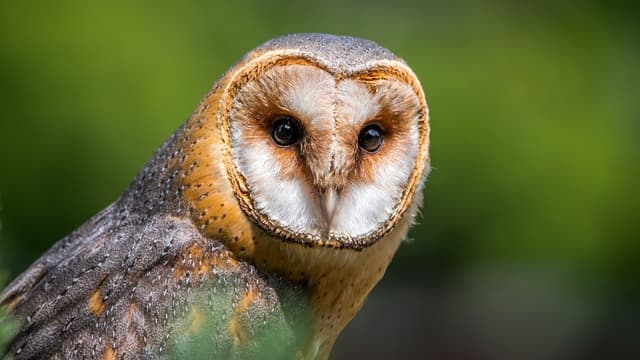Do owls poop? All the answers to your burning questions!
Maybe you’ve returned to your car after a brief errand only to discover a messy splatter of pigeon droppings on your window. A quick visit to the nearby car wash would take care of that. However, what if a magnificent great-horned owl, standing at 2 feet tall and weighing 3 pounds, flew over your car? Would you need to be concerned about a larger mess? Do owls poop?
Let’s delve into everything you’ve ever wanted to learn about owl poop!
Do Owls Poop?
Yes, owls do poop. Additionally, they have the unique ability to regurgitate pellets. Food enters their bodies through one end and exits through two different ways. Owls poop waste through their back ends while regurgitating pellets from their mouths.
Different Types of Owls
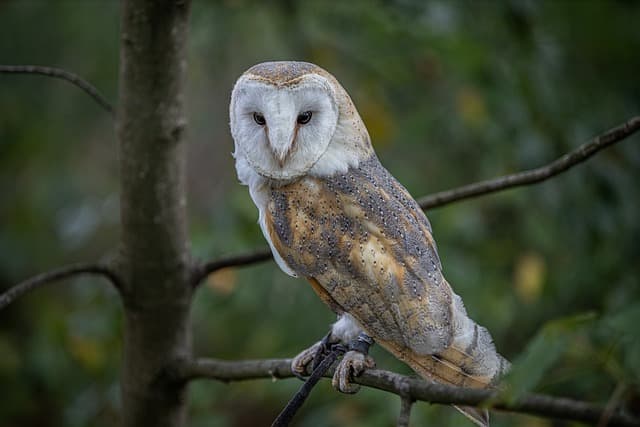
There are various types of owls in the world. These birds of prey are nocturnal hunters and their hooting might keep you awake at night. With their large forward-facing eyes and curved beak, they have a distinctive appearance.
Some owls have tufts of hair on their heads, resembling long ears or horns. The elf owl holds the title for being the smallest owl, about the size of a hamster.
On the other hand, the great-horned owl takes the crown for being the largest, reaching up to 2 feet in height. You might recognize the snowy owl from the Harry Potter series, as it resembles Hedwig.
Throughout the years, many cartoons have featured a wise old owl character, such as Owl from Winnie the Pooh, who was portrayed by a Eurasian eagle-owl in the live-action adaptation of the story in 2018.
Barn owls are the most widespread owl species, found almost everywhere except the frigid poles, scorching deserts, and a few islands.
Read Also: Do Birds Have Ears?
What does owl poop look like?
Have you ever wondered what owl poop looks like? Well, it actually resembles pigeon poop, with a slimy white texture. The white coloration is attributed to the presence of uric acid. If you suspect the presence of an owl nesting in your shed, observe for indications of dried white owl excrement on the surrounding wood and surfaces beneath it.
Does owl poop smell?

Absolutely! Since owl poop is composed of the undigested remains of meat, it tends to have an unpleasant odor. However, it’s worth noting that pellets, which are regurgitated by owls, do not have any noticeable smell.
What are owl pellets?
Owl pellets are these little bundles of undigested food that come from an owl’s stomach. You see, owls have this interesting way of eating where they swallow their food whole. But because they can’t digest bones, fur, feathers, beaks, and teeth, those bits get sorted out in their gizzard and then coughed up as a ball of yucky stuff.
How do Owls Digest their Food?

Let’s consider the scenario of a barn owl catching a small mouse. The owl swiftly grabs the mouse and uses its powerful talons to instantly crush it. Instead of chewing, owls swallow their prey whole.
Since owls lack teeth, the dead mouse travels down the owl’s throat (esophagus) and enters the first part of its stomach (proventriculus), where the digestion process begins. In the proventriculus, the food mixes with enzymes, acids, and mucus to aid in breaking down the mouse’s body. It then moves into the second part of the stomach (ventriculus or gizzard), where the muscles contract and expand to further break down and separate the food.
Although the enzymes in the first part of the stomach are strong, they are not potent enough to break down bones, beaks, and teeth. These indigestible parts are formed into a pellet and sent back up to the first part of the stomach. The remaining food continues its journey through the small intestine, large intestine, cloaca, and vent. The pellets remain in the proventriculus until they are ready to be regurgitated, while the waste stays in the cloaca until the owl is ready to eliminate it.
Read Also: Do Beavers Eat Wood?
How often do owls poop?

The frequency of owl poop varies depending on the owl species and their diet. Generally, owls tend to poop multiple times a day. However, smaller owls tend to have more frequent pooping habits compared to larger owls.
How Often Do Owls Regurgitate Pellets?
Owls typically regurgitate a pellet once every day. These pellets are formed by combining the remains of various animals into a single pellet. Before being expelled, these pellets can remain in the proventriculus for approximately 10 to 20 hours.
What do Owls Eat?
Owls have a diverse diet as they are carnivores. They consume a wide range of animals, including small mammals, insects, reptiles, amphibians, and even other birds. Let’s take a look at what some common owls prefer to feast on:
Barn owl: Their menu consists of mice, fish, rodents, birds, and small mammals.
Great-horned owl: These mighty owls go for larger prey such as osprey, falcons, rabbits, squirrels, and even skunks.

Tawny owl: voles, fish, and lemmings are their preferred choices.
Screech owls: They have a taste for insects, slugs, snails, fish, amphibians, and small rodents.
Elf owl: These tiny owls enjoy a diet of insects, earthworms, and beetles.
Can owls poop mid-air while flying?

Did you know that owls have the ability to poop while flying? However, they tend to prefer relieving themselves just before taking off to make their flight easier. It’s quite logical when you think about it! Owls have a speedy metabolism and can digest food quickly, allowing them to poop whenever and wherever the need arises.
Do baby owls wear diapers?
No way; baby owls definitely don’t wear diapers. If you come across an owl’s nest, you will observe that they defecate right there in the nest. Additionally, you will probably find piles of pellets, as adult owls frequently regurgitate from their roosting spots.
Do baby owls make pellets?
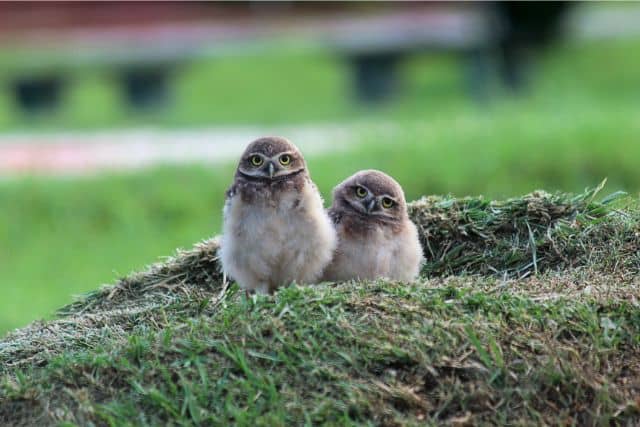
Not immediately. Baby owls rely on their parents for food. The male owl hunts for food and brings it back to the nest, while the female owl breaks it into smaller pieces to feed the baby owls. It is only when the baby owls begin eating on their own and swallowing food whole that their bodies will start producing pellets.
How Can You Identify Bird Poop?
Did you know that identifying bird poop can provide valuable insights into their lifestyle? For example, if you find bird poop on your car window, it’s unlikely to be owl poop. Owls are nocturnal creatures and prefer to relieve themselves before taking flight to reduce their weight. It’s important to avoid handling any type of bird poop as it can carry diseases and make you sick.
Interestingly, trained conservationists can study owl droppings to learn more about their habits. In one research study, scientists examined the effects of stress on Spotted Owls by analyzing their poop. They discovered that owls living closer to major roads used by logging companies had twice the levels of cortisone compared to owls living further away. This opens up exciting possibilities for further research!
Read Also: Are Birds Mammals?
Conclusion: Do owls poop?
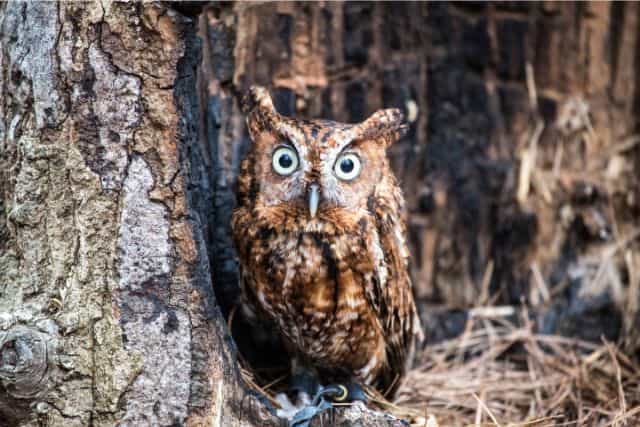
In conclusion, the answer to the burning question, “Do owls poop?” is a resounding yes. These enigmatic birds, ranging from the mighty great-horned owl to the petite elf owl, engage in the essential act of waste elimination. Their digestive process involves not only conventional waste expulsion but also the fascinating regurgitation of pellets containing indigestible parts.
Observing owl poop reveals a striking resemblance to pigeon poop, characterized by a slimy white texture attributed to uric acid. The journey of how owls digest their food, swallow prey whole, and form pellets with undigested remnants adds a layer of intrigue to their already captivating existence.
Furthermore, the frequency of owl poop and pellet regurgitation varies among species, showcasing the diversity within the owl family. Whether it’s the majestic great-horned owl or the tiny elf owl, each contributes to the ecosystem in its own unique way.
So, the next time you wonder about owl poop on your car or in your surroundings, remember that it’s not just waste; it’s a testament to the fascinating and vital role these birds play in the natural order.
Do owls poop? All the answers to your burning questions!
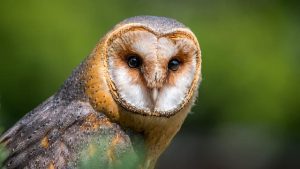
Title: Do owls poop? All the answers to your burning questions!
Description: Curious about owl poop? Dive into the whimsical world of "Do Owls Poop" to uncover the mysteries behind these fecal wonders. Explore the science, folklore, and conservation aspects of owl poop in this informative and entertaining journey.
Start date: February 10, 2024
Author: Muhammad Ali
-
Quality - 94
-
Information - 95
-
Content - 96
-
Writing Style - 97
-
Awesomeness - 98
Summary
In summary, owls do engage in the essential act of excretion, showcasing a dual process involving regular waste elimination and the intriguing regurgitation of pellets. The composition of owl poop, resembling pigeon droppings with its slimy white texture, is a result of uric acid presence. The diverse world of owls, from the majestic great horned owl to the pint-sized elf owl, reveals a range of fascinating behaviors and dietary preferences.
The unique digestive journey of owls, from swallowing prey whole to the formation of pellets containing undigested parts, adds a layer of complexity to their existence. The fact that owls can release waste mid-air, owing to their rapid metabolism, showcases their adaptability in various situations. Moreover, the distinct diets of different owl species, encompassing small mammals, insects, and even other birds, contribute to their role as formidable nocturnal hunters.
Exploring the realm of owl droppings provides not just a curious glimpse into their daily lives but also serves as a valuable tool for scientific research. Conservationists can decipher crucial information about owl habits and environmental stress levels through the study of their droppings. In essence, beyond the iconic hoots and nocturnal presence, the world of owls is a realm of intricate biological processes and ecological contributions, making these birds even more captivating in the eyes of nature enthusiasts.
